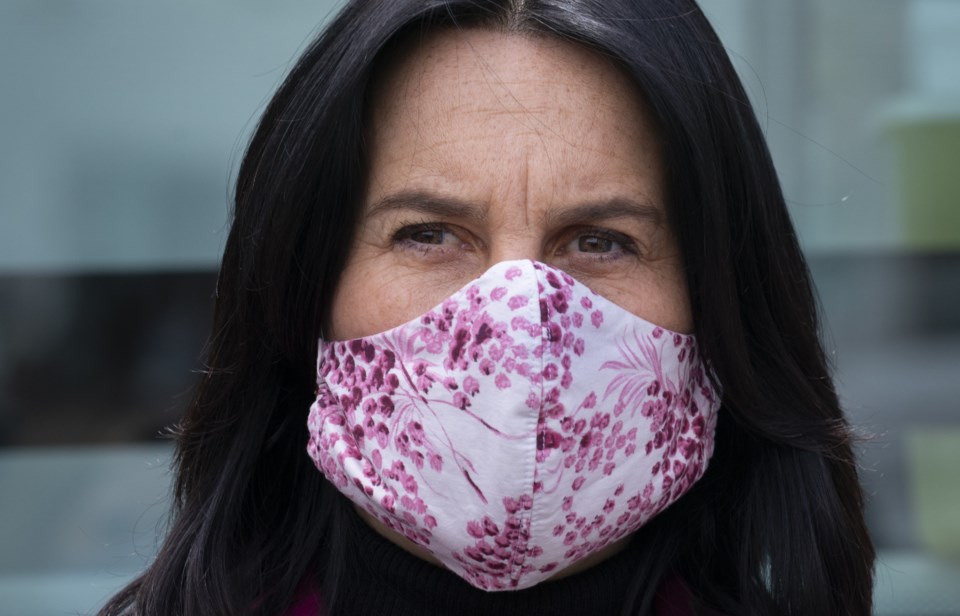Canadians are growing more accustomed to wearing cloth face masks while walking around their neighbourhoods or running errands during the COVID-19 pandemic.
But if those masks aren't being sanitized regularly, experts say they could be harmful.
Dr. Lisa Bryski, an emergency room physician in Winnipeg, says we should be treating our cloth masks just as we would our hands.
That means washing them every time we come in from outside. And not just a quick rinse.
"There's a difference between cleaning and sanitizing," Bryski said. "Cleaning is where you just take the visible dirt off a surface whereas sanitizing is when you kill whatever (is on the surface) to make it healthy for contact with a human.
"Once you take a mask off, you've got the inner area of it exposed to the environment. And that area now has just as much risk of passing a virus along as the outer area that had been your barrier."
Cloth masks can be useful in keeping novel coronavirus droplets from travelling from a person's nose or mouth into the air, where they can potentially infect others.
Because asymptomatic people can still spread COVID-19 without knowing they have it, it's best to think of a mask — and both of its sides — as a potential hazardous material, says Prof. Dasantila Golemi-Kotra, an expert in molecular biology at Toronto's York University.
"Treat it as though its carrying virus particles," said Golemi-Kotra, adding that washing hands after handling a used mask is also important.
"If you're not washing your mask and you're just leaving it somewhere, those (particles) get into the environment that you're living in."
Golemi-Kotra says the best way to sanitize a cloth mask is to let it soak in warm soapy water for at least an hour. Bryski says to wash it with soap and hot water for "at least 20 seconds" — though a longer scrub may be needed — making sure to get in all the crevices of the mask like you would with your hands.
The key, Bryski says, is the soap: "the little superhero in all of this."
"Water alone doesn't really break up that attraction that the virus has for the skin, but soap outcompetes the virus and also is good at breaking up the lipid barrier of the virus," she said, adding that regular hand or dish soap that doesn't contain lotion or moisturizer will work. "So it's kind of a double whammy."
Cloth masks can also be sanitized in the washing machine with hot water and regular detergent. Bleach can be added to ensure an extra clean, but its not necessary.
"The effect (of bleach) is pretty much the same as an effective detergent — removing organic matter out of the cloth," Golemi-Kotra said. "The detergent itself actually physically gets into the virus particles and disrupts it to the point of disintegration."
Satinder Kaur Brar, an expert in environmental biotechnology and decontamination and a professor at York University, says bleach can actually cause more harm than good if it's not properly washed away.
"It could lead to skin problems, especially for kids if they're using those masks," she said. "So I would rather suggest using a normal soap."
Drying cloth masks is another important step in the sanitation process. A clothes dryer, with heat acting as an additional element in killing the virus, is the best bet.
Those without access to a dryer can hang their wet masks in a safe space, and a quick ironing can also provide an extra heat boost. Bryski warns to make sure a mask is fully dried before wearing it again though, as mould can grow on damp surfaces.
While some on social media have suggested using a microwave to sanitize masks, experts say that's not advisable. It can also be dangerous, especially with surgical masks and N95s that contain metal strips to help form them to your face.
Golemi-Kotra stressed that those types of masks, which are unable to be washed because of their material, are meant for single use. If you have to sanitize a surgical mask, she recommends letting it air out for at least a day in a safe space, to allow any potential virus particles to dissipate on their own.
Swirling cloth masks around in boiling water — especially without soap — or putting them in the dishwasher, is also ineffective, Bryski said.
"(A dishwasher) is not going to agitate the material and it might get caught up in the mechanism somewhere and cause electrical problems that may be disastrous," she said. "And you don't want to microwave your mask, there's not any proof that's going to be useful and it might actually harm the material."
Masks may become more commonplace in Canada as some grocers nationwide are now advising shoppers to wear them in their stores. Hair salons that recently re-opened in Manitoba are also asking clients to wear masks during their appointments.
Experts suggest making or buying two or three cloth masks that can be switched out when one is being sanitized.
"Kind of like underwear, we're recirculating, putting on a fresh pair," Bryski said. "So we've got to do that with our face hygiene too."
Golemi-Kotra says it's best to create a habit out of mask-washing so we remember to do it after each use.
And sanitizing should be done whether or not we're coming into contact with other people while wearing our masks.
"You use a mask, you wash it afterwards," Golemi-Kotra said. "You may think, 'Oh I'm just going for a walk I don't have to wash it,' but when you make something a habit, the risk of becoming complacent is much smaller."
This report by The Canadian Press was first published May 7, 2020.
Melissa Couto, The Canadian Press




